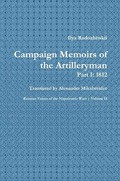How do you hope your Russian Voices of the Napoleonic Wars will renew study of 1812? How will it change the way we think about campaign?
Russia played a decisive role in the Napoleonic Wars and the success in the struggle against Napoleonic France allowed the Russian leaders to shape the course of European history. Yet Russian voices are oftentimes absent from the pages of historical accounts since linguistic difficulties, administrative hurdles and political and ideological rivalries combined to create a substantial dearth in English translations of Russian narratives of the Napoleonic Wars. For a long time the history of the Napoleonic Wars has been dominated by a select few “voices” and much of what has been written on the human experiences of the Napoleonic Wars is based on the French and British, and to a lesser degree German, material.
This new series will hopefully provide sufficient tools to historians to ensure that the Russian “voice” is given a proper place in the discourse. I believe that these memoirs and diaries show the other side of the proverbial coin, providing an unique insight on the Russian side of the war, how and why decisions were made and what Russian officers and soldiers experienced as they slowly progressed towards the victory.
What were your selection criteria for translating and publishing the memoirs and documents that have been included in the series? There must be many Russian language texts sitting untouched, unread and unknown to western readers…
 As of today, only a handful of Russian memoirs are available in English, even though there are over 350 memoirs and diaries illustrating Russian experiences of the Napoleonic Wars. This series seeks to present a small fraction of this massive literature to the Western audience. For the first volumes in the series, I tried to select memoirs that cover a wider timeframe – i.e. Pavel Pushin's diary covers the last three years of the war (1812-1814), as do the memoirs of Ilya Radozhitskii, whose volume one deals with 1812. As the series progresses, I will also include smaller, more focused, memoirs that deal with specific events (usually battles).
As of today, only a handful of Russian memoirs are available in English, even though there are over 350 memoirs and diaries illustrating Russian experiences of the Napoleonic Wars. This series seeks to present a small fraction of this massive literature to the Western audience. For the first volumes in the series, I tried to select memoirs that cover a wider timeframe – i.e. Pavel Pushin's diary covers the last three years of the war (1812-1814), as do the memoirs of Ilya Radozhitskii, whose volume one deals with 1812. As the series progresses, I will also include smaller, more focused, memoirs that deal with specific events (usually battles).
How does Russian historiography differ from what is being discussed and studied elsewhere, in Europe and in the US?
When it comes to the Russian Campaign, Russian historiography is, unquestionably, the most extensive and numbers in the hundreds of volumes. As in France, first attempts at analyzing the Russian Campaign appeared as early as 1813 when participants began publishing their views on the war. Dmitri Buturlin, Alexander Mikhailovskii-Danilevskii and Modest Bogdanovich, the most famous of the 19th century historians, were instrumental in developing the foundational tenets of Russian imperial historiography. After the Bolshevik Revolution of 1917, the Russian historians became influenced by the Marxist school that rejected Imperial historiography and evaluated the Russian campaign through the prism of economic materialism and class struggle. The Soviet period saw the appearance of hundreds of publications on various aspects of the war but such an overabundance of studies was not without its weaknesses. The war was discussed in overly patriotic tones and exploited for ideological purposes; many Soviet studies contain deliberate exaggeration or distortion of the facts. After the Second World War the Soviet government, under Joseph Stalin, tried to portray its performance during the German Invasion of the USSR in World War II in the same terms as of the Russian government against Napoleonic France, and historians – most famously Liubomir Beskrovnyi and Pavel Zhilin – followed this 'formula' for decades, spending their careers fighting the 'evils of bourgeois historiography'. Soviet ideological approach was largely abandoned in the 1990s, and a new generation of scholars have produced a new wave of publications that seek to reassess the campaign. An important feature of these publications is a reliance on a wide range of sources and the works of A. Popov, V. Zemtsov, V. Bezotosnyi, and others incorporate Russian, French, Polish, German and English language sources. As a result, recent Russian studies tend to offer more detailed and balanced insights into the key events of the Russian campaign.
On a more negative note, the Russian historians tend to concentrate almost exclusively on the Russian campaign. Few historians digress to other topics. Thus, the proceedings of the annual historical conferences “Epokha napoleonovskikh voin: lyudi, sobytiya, idei and Otechestvennaya voina 1812 goda: istochniki, pamyatniki, problem” rarely feature articles on pre- or post-1812 events outside Russia, while the Russian campaign itself is explored in minute detail. There are still no general studies on the Napoleonic Wars similar to works by Charles Esdaile and Dominic Lieven or fresh assessments of individual campaigns and political-diplomatic developments (there are of course exceptions; for example Oleg Sokolov's two volume work on the War of the Third Coalition, and Sergei Iskjul's work on Russia's foreign policy in Germany).
The Fondation Napoléon is particularly interested in digital history: what sort of impact is technology and the internet having on the study of history in Russia?
The recent wave of digitization augurs the golden age of research – a scholar in Russia can nowadays access an increasing variety of sources, many of them previously unavailable. The Russian State Library has a magnificent digital library with thousands of volumes while sites like Runivers offers digital versions of hard-to-find titles and periodicals. At the same time digital projects in France (the Gallica project, the Fondation Napoléon's own digital library) and the US (the Google Book project) provide access to tens of thousands of titles that a Russian researcher would have found difficult to obtain.


